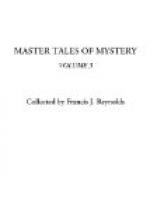“I went to his house once,” said Ransome—“had to. A lame Indian in a suit of gaudy red-and-white stripes opened the door. I knew that striped canvas. It was the awnings of the old Lily Grant, and I saw along the seams the smoke-marks of the fire that had burnt her innards out.... Then the Indian opened the jalousies with a hand like a bundle of brown twigs, and the light shone through green leaves on the walls of the room. From ceiling to floor they flashed as if they were jeweled, only there are no jewels with just that soft bloom of color. They were the cases full of Henkel’s butterflies.
“The Indian limped out and Henkel came in. He was limping, too. I looked at his feet and I saw that they were in a pair of some one else’s tan shoes. That and a whiff from the servants’ quarters made me feel a bit sick. I wanted to say what I had to say and get out as quick as I could. But Henkel would show me his butterflies. Most of us in that place were a little mad on some point. I was, myself. Henkel was mad on the subject of his butterflies. He told me the troubles he’d had getting them from Indians and negroes, and how his men cheated him. He took it very much to heart, and snuffled as he spoke. ‘And there’s one I haven’t got,’ he said, ’one I’ve heard of but can’t find, and my lazy hounds of hombres can’t find it either, it seems. It’s one of the clearwings—transparent. Here’s a transparent silver one. But this new one is gold, transparent gold, and the spots are opaque gold.’ His mouth fairly watered. ’I tell you, I will spend anything, pay anything, to get that gold butterfly. And if the natives can’t or won’t find it for me, my friend, I’ll send for some one who can and will.’
“I quite believed him, though I was no friend of his. I didn’t know much about butterflies, but I guessed that in Paris or London his collection would be beyond price. But I wasn’t prepared, two months later, for Scott and his friend.
“Derek Scott. Ever meet him? A very ordinary kind of young Northerner. He was remarkable only in having everything a little in excess of his type—a little squarer in jaw and shoulder, a little longer in nose and leg, a little keener of eye and slower of tongue. I’d never have looked at him twice, as he landed from the dirty steamer with a lot of tin boxes, if it hadn’t been that he was hale and sound, with hope in his eyes. Health and hope, at Herares!
“Then little Daurillac ran up the gangway, laughing. I looked at him—every one did—and wondered. And then, to cap the wonder, the two came up to me with their friendly, confident young faces, and asked for Henkel’s house.
“‘Turn to the left,’ I said. And then I added, ’You’ll excuse me, but what does Henkel want of you?’
“Scott didn’t answer at first, but looked me over with his considering eyes, and I remembered a collarless shirt and a four days’ beard. But Daurillac said, ’He wants butterflies of us, Monsieur. I am an entomologist, and my friend he assists me.’ He drew up very straight, but his eyes were laughing at himself. Then we exchanged names and shook hands, and I watched them going along the path to Henkel’s.




